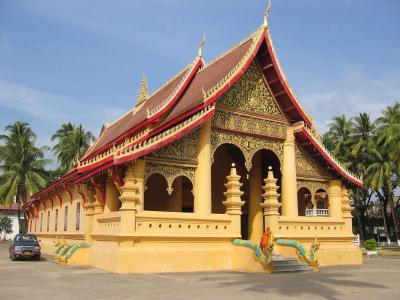Wat Ong Teu (Temple of the Heavy Buddha), Vientiane
Temple of the Heavy Buddha stands as a prominent Buddhist monastery in the heart of Vientiane. The temple derives its name from the colossal bronze Phra Ong Teu Buddha statue housed within its walls, which is renowned as the largest Buddha image in Vientiane.
Originally constructed during the 16th century under the reign of King Settathirat I, Wat Ong Teu has weathered the storms of history, enduring periods of foreign invasion and subsequent reconstruction. The temple's inception coincided with Laos' golden age of Buddhism, a time of cultural and religious flourishing amidst external pressures.
Despite potential demolitions and reconstructions over the centuries, Wat Ong Teu maintains its architectural significance, embodying the distinctive features of the Luang Prabang I style. Characterized by its sparing use of brickwork and rectangular structure, the temple stands as a testament to Laos' rich cultural heritage.
Legend has it that Wat Ong Teu was strategically positioned along a cardinal point in alignment with three other temples, although whether this arrangement was intentional or coincidental remains a subject of speculation. Today, the temple continues to attract visitors and worshippers alike, offering a glimpse into Laos' spiritual traditions and historical legacy.
Originally constructed during the 16th century under the reign of King Settathirat I, Wat Ong Teu has weathered the storms of history, enduring periods of foreign invasion and subsequent reconstruction. The temple's inception coincided with Laos' golden age of Buddhism, a time of cultural and religious flourishing amidst external pressures.
Despite potential demolitions and reconstructions over the centuries, Wat Ong Teu maintains its architectural significance, embodying the distinctive features of the Luang Prabang I style. Characterized by its sparing use of brickwork and rectangular structure, the temple stands as a testament to Laos' rich cultural heritage.
Legend has it that Wat Ong Teu was strategically positioned along a cardinal point in alignment with three other temples, although whether this arrangement was intentional or coincidental remains a subject of speculation. Today, the temple continues to attract visitors and worshippers alike, offering a glimpse into Laos' spiritual traditions and historical legacy.
Want to visit this sight? Check out these Self-Guided Walking Tours in Vientiane. Alternatively, you can download the mobile app "GPSmyCity: Walks in 1K+ Cities" from Apple App Store or Google Play Store. The app turns your mobile device to a personal tour guide and it works offline, so no data plan is needed when traveling abroad.
Wat Ong Teu (Temple of the Heavy Buddha) on Map
Sight Name: Wat Ong Teu (Temple of the Heavy Buddha)
Sight Location: Vientiane, Laos (See walking tours in Vientiane)
Sight Type: Religious
Guide(s) Containing This Sight:
Sight Location: Vientiane, Laos (See walking tours in Vientiane)
Sight Type: Religious
Guide(s) Containing This Sight:
Walking Tours in Vientiane, Laos
Create Your Own Walk in Vientiane
Creating your own self-guided walk in Vientiane is easy and fun. Choose the city attractions that you want to see and a walk route map will be created just for you. You can even set your hotel as the start point of the walk.
Vientiane Introduction Walking Tour
Vientiane, the capital of Laos, is a colorful city, the history of which is reflected in its centuries-old shrines, memorials, garden squares, and colonial architecture lining broad boulevards and leafy streets.
The name "Vientiane" is the French rendition of the Lao word viangchan, in which viang refers to a "walled city" and chan derives from Sanskrit candana, translating... view more
Tour Duration: 2 Hour(s)
Travel Distance: 2.9 Km or 1.8 Miles
The name "Vientiane" is the French rendition of the Lao word viangchan, in which viang refers to a "walled city" and chan derives from Sanskrit candana, translating... view more
Tour Duration: 2 Hour(s)
Travel Distance: 2.9 Km or 1.8 Miles
Vientiane Temples Walk
The capital of Laos, Vientiane, is in the heart of the Buddhist world. This explains the presence in the city of numerous temples and shrines making up the bulk of local landmarks. Scattered across the city, these religious sites hold significant historical and spiritual importance, drawing visitors from all over the globe.
Indeed, some of the country's most notable sanctuaries are found... view more
Tour Duration: 2 Hour(s)
Travel Distance: 3.0 Km or 1.9 Miles
Indeed, some of the country's most notable sanctuaries are found... view more
Tour Duration: 2 Hour(s)
Travel Distance: 3.0 Km or 1.9 Miles





